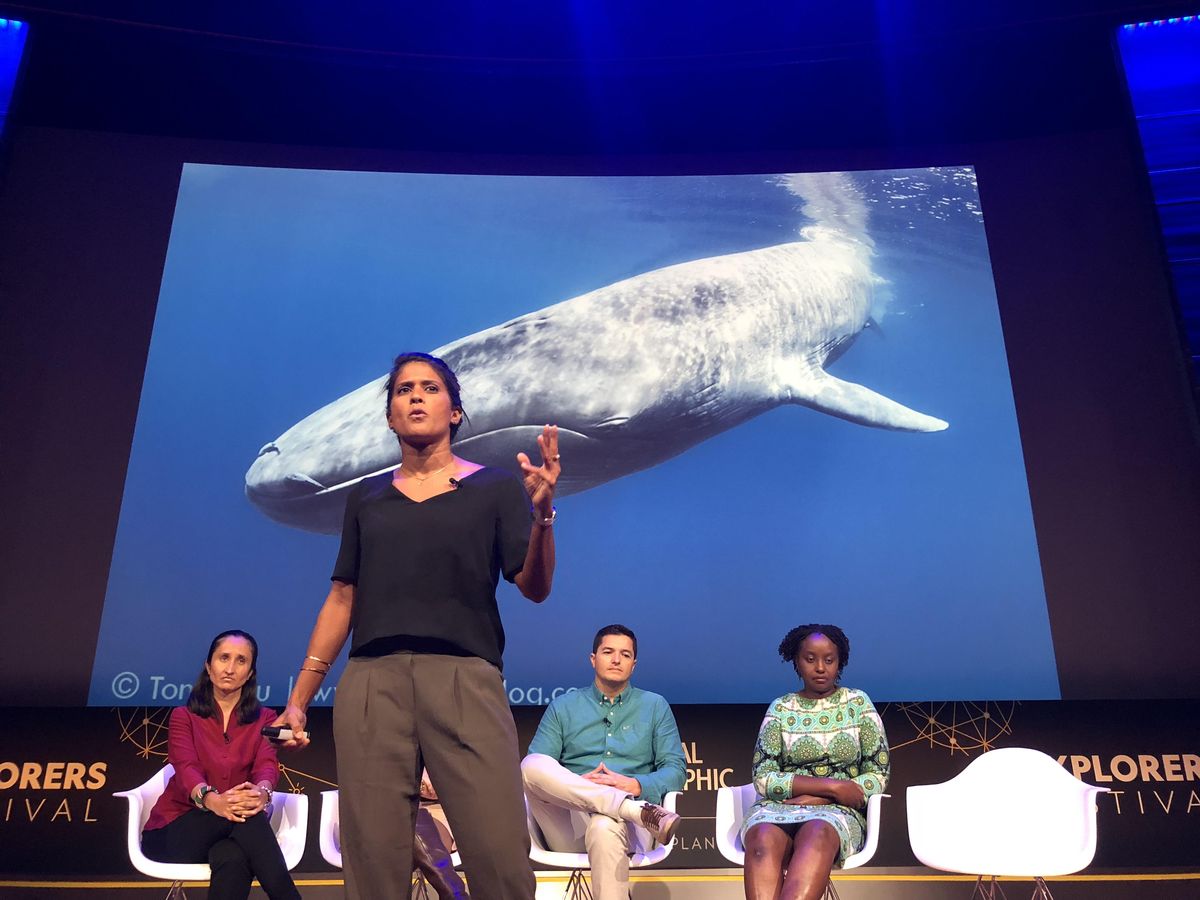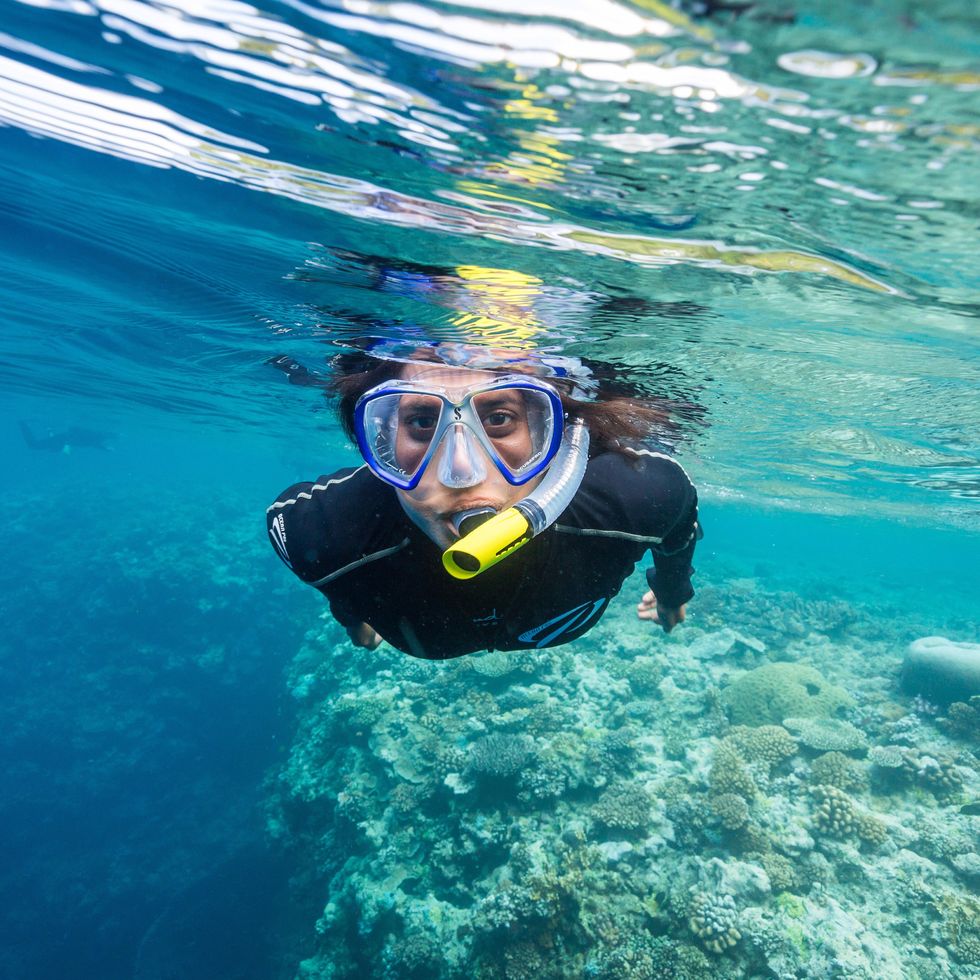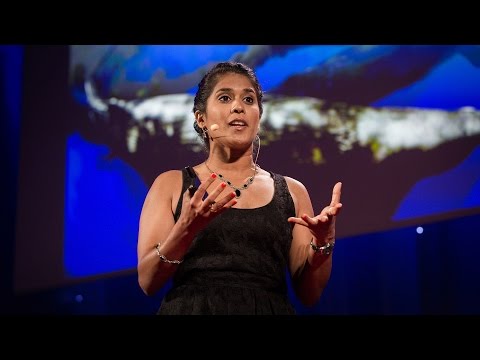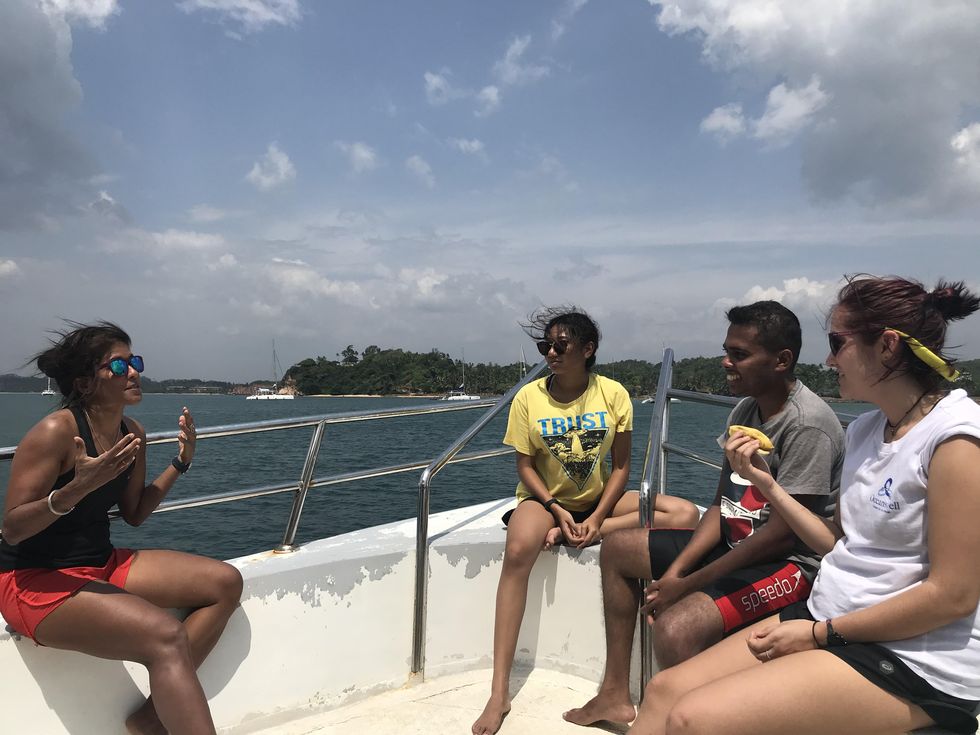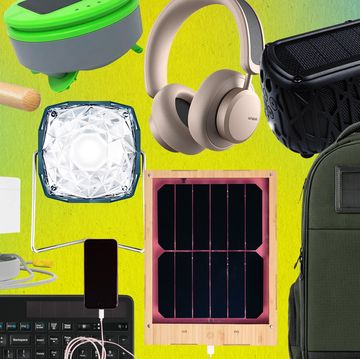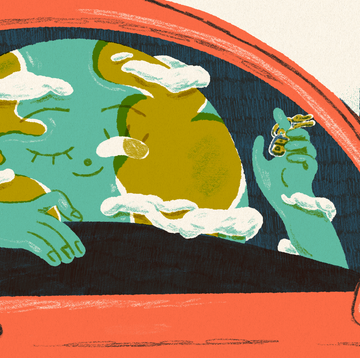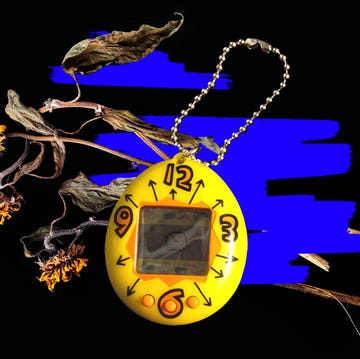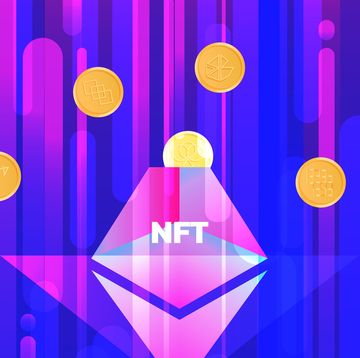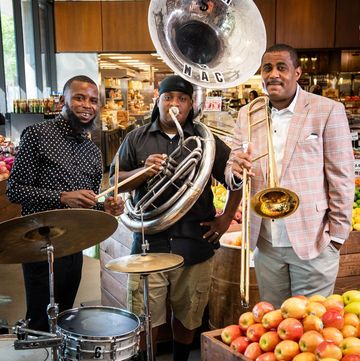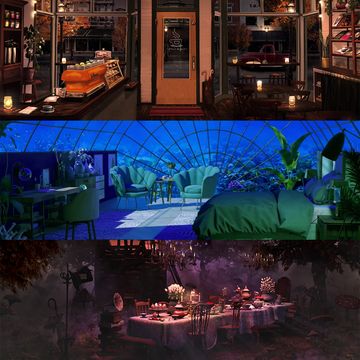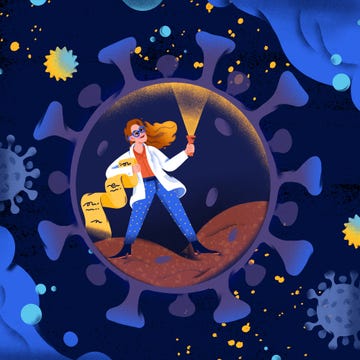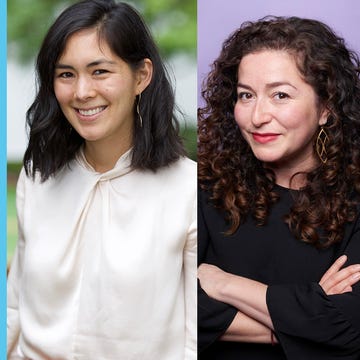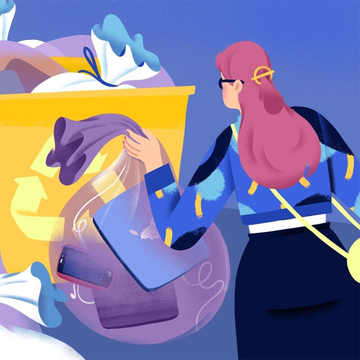“The whales don’t need us, but we need the whales,” says Asha de Vos, 42. She is considered one of the world’s foremost experts on blue whales though she’s always been, in her own words, “too young and too female.”
She has been leading the first long-term study on blue whales, founded Sri Lanka’s first marine-protection NGO, Oceanswell, and won Scuba Diving magazine’s Sea Hero Award in 2020. She was named one of BBC’s 100 most inspirational and influential women of 2018. Despite our fascination with the biggest animal that has ever lived on Earth, we know astonishingly little about them. But de Vos believes we all need to be grateful to whales because of their contribution to the oxygen we all breathe on Earth. She also makes a point that’s rarely made: She speaks out about “parachute science.” Because she had difficulty gaining access to research opportunities and finding funding, she had to scrub toilets in order to get on her first whale-research boat, and because she could not afford rent as a research assistant, she lived in a tent for six months in New Zealand. When she first made a groundbreaking discovery that blue whales were feeding in the waters around Sri Lanka in the Indian Ocean, she was immediately told that Western scientists would be flown in to study it. “I get it. These phenomena happen in attractive locations, but if scientists don’t train and educate the local population, conservation is not sustainable.”
Shondaland caught up with de Vos about her work on whales and specifically talked with her about her goals to help blue whales thrive in an increasingly challenging marine environment.
MICHAELA HAAS: Sri Lanka has a rich underwater world, and yet you are the first Sri Lankan marine biologist with a PhD in marine mammal science. How come?
ASHA DE VOS: When I started out in my career, people thought it was a ridiculous field to go into. Here in Sri Lanka, everybody was like, “Wow, that’s so odd. Why do you want to be a marine biologist?” If you want to be somebody in Sri Lanka, you become a doctor, a lawyer, or an engineer. As an island nation, the ocean is really an extension of us, but we haven’t embraced that. I was looking out at the sea and thought, there is a whole world out there to discover. I felt like I was on the right path. My job is to unravel these mysteries of the ocean but also take that science and turn it into stories so more people can realize there’s this whole magical kingdom underneath and fall in love.
MH: But a lot of Sri Lankans sustain themselves through fishing, so isn’t there a natural connection to the ocean?
ADV: When I grew up, the ocean was something that I saw fly past the school bus window every day. We didn’t visit the ocean for pleasure. It is only now that people are starting to surf, dive, and snorkel. The fishermen interact with the ocean, but in many cases, they are fearful of the ocean. Everybody in Sri Lanka knows somebody who drowned. They might have a connection with the ocean, but it’s very much in connection with their livelihoods. They might notice that the size of the fish diminishes, but there’s no one who’s necessarily proactively engaged in conservation. That is what has really been missing, but that’s changing now.
MH: How did your parents respond to your career choice?
ADV: My parents always made space for curiosity and allowed a lot of questions. As a young kid, I loved research, and my parents would say, okay, let’s look it up in the encyclopedia. I also come from a conservation culture because my dad is an architect and restored a UNESCO World Heritage Site in Sri Lanka, the Galle Fort, a fort the Portuguese built here in the 16th century. We also had pets, like scorpions and caterpillars in jars in our bedroom. We were always outside.
MH: That obviously prepared you well for your career. In order to finance your studies, you dug up rotten potatoes in potato fields in Scotland for many months, lived in a tent in New Zealand for six months because you couldn’t afford housing there, and then only made it onto your first whale-research vessel because you bothered the owner of the boat every day for three months.
ADV: I had to study abroad because this field of study is not offered at our universities in Sri Lanka. I thought my money would last longer, but then I realized that I couldn’t even afford housing when I worked as a research assistant on a project observing dolphins in New Zealand. Then I found out about this whale-research vessel that was circumnavigating the globe and figured it was a once-in-a-lifetime opportunity. I wrote to the CEO of Ocean Alliance, and he said no. I was like, come on, this is ridiculous; who else would they have on the boat? So, we had this back and forth for three months until they let me on board for two weeks as a deckhand. I was basically scrubbing toilets. After two weeks, they realized that I was a hard worker and truly passionate, so they let me stay. My career started from there.
MH: I learned some of the most incredible things from watching your TED Talk, including that we humans can’t breathe without whale excrement. What exactly is the connection between whale excrement and our breathing?
ADV: Everybody thinks we want to protect the whales because they’re charismatic and magnificent. But we tend to forget the purpose they serve: They’re ecosystem engineers; without them, the oceans wouldn’t function properly. The whales dive to find nutrient-rich meals at the bottom of the ocean; when they come back up, their poop with all those nutrients spreads on the surface of our oceans and feeds the phytoplankton, tiny microscopic algae. The phytoplankton are super-important because they are basically the bottom of every marine food web. Everything exists in the ocean because phytoplankton exists. The more we have, the better. They feed on sunshine, photosynthesize, and then release oxygen. They are literally part of the oxygen we breathe. About 50 to 70 percent of the oxygen we breathe is generated by different plants in the ocean, a lot of it by the phytoplankton. And at least a proportion of it is fertilized by this amazing whale poop. Because of the rising water temperatures, the marine phytoplankton has been decimated by about 20 percent in the Indian Ocean. That’s why we should thank the whales with every breath we take. Whale poop changed my life.
MH: How so?
ADV: When I finally made it onto my first whale-research vessel as a deckhand, there was this moment when I spotted this gigantic blue in the distance, six blue whales, each the size of a football field. We stuck around, and one of the whales pooped. It’s unmistakable, such an eye-catching red color.
MH: Why is their excrement red, and why is that significant?
ADV: It’s red because of what they feed on here, a type of shrimp whose exoskeleton is red. It was my eureka moment, because until then we didn’t know that blue whales feed in the tropical waters of Sri Lanka. This area is not supposed to be conducive to feeding purposes for these animals. I fell deeply in love with this beautiful red substance.
MH: Whale conservation is one of the big success stories of the past century. Two hundred years of whale hunting decimated their numbers by 60 to 90 percent, but they recovered through the Save the Whales movement in the 1970s, which led to the ban of commercial whaling in the early ’80s. What kind of whale conservation do we still need?
ADV: All these people coming together against whaling in the Save the Whales movement was a huge, pivotal moment. But today there are other threats these whales face, shipping being one of the biggest threats to whales across our oceans. Ninety percent of everything is shipped. That means you and I are to blame as well, because we all own things that come from across the oceans. Entanglement in fishing gear is another issue, especially for smaller whales such as the North Atlantic right whale. Climate change and ocean warming presents major challenges. In the past, it was easy to point and say, we can stop these whaling groups, but now we have these very dispersed problems. The issue of all of us. We also monitor whale watching very closely. While it is a better alternative than whaling, for sure, it matters how it’s done. Imagine you are sitting down with your family, having a lovely dinner, and then these strangers come crashing through the front door, play loud music, and scatter their trash everywhere. That’s how we treat these animals. We need to respect these animals in their own homes, not just for their sake but also for our sake because they also help fight climate warming.
MH: How do they help fight global warming?
ADV: Did you know that whale carcasses collectively transport about 190,000 tons of carbon? Basically, anybody absorbs a certain amount of carbon. Because the whales are giant, they can hold a lot more carbon. When a whale carcass sinks to the bottom of our ocean, that carbon is trapped and doesn’t get released into the atmosphere, or at least not for a very long time. We call it a carbon sink. It buffers us from some of the worst impacts of climate change. It also provides a food source for the species that live down there. There are probably species that live down there that we don’t even know about. Of course, there is going to be a tipping point after which the oceans won’t be able to hold on to that excess carbon. This is part of what fascinates me: We haven’t really explored the magic of the ocean; there is so much we don’t know. I also want to encourage people to be curious about their own backyards. Never forget, your backyard has so much to offer. We’re always so busy trying to go somewhere else, because that grass is always greener, that we forget that there’s just lots of work to be done. The power lies in really coming together; the ocean is an interconnected space. Seventy percent of our planet is oceans. We need a giant army of local ocean heroes if we really want to protect it. That’s key.
MH: You often speak out against “parachute science,” meaning Western scientists studying phenomena in underdeveloped countries, and how hard it is for a native Sri Lankan to actually get research opportunities in their own waters. Do you see this changing?
ADV: This problem is not unique to Sri Lanka but to a lot of people from countries like ours. When I discovered the red whale poop, I was immediately told, “We’ll fly in scientists who can research this.” Okay, I was at the lowest rung of the boat hierarchy, but, still, I made this discovery. So, I said I will continue researching this phenomenon. A lot of the big conservation problems are in exotic countries like Sri Lanka, which attract people. I fully understand that, but, at the same time, there’s been a history of people coming from wealthier countries, collecting data, publishing papers, and they don’t engage with the people on the ground. It’s not a sustainable model, especially in conservation, where we need to develop leadership in every community but also understand that there is so much knowledge on the ground. The parachute-science model doesn’t allow for that. Historically, it’s taken away opportunities from people on the ground, crippled conservation scientists. In some parts of the world, we still hear of Western scientists “discovering” populations and stuff. Let’s be honest, the locals have always been there, but somehow it’s only real if a scientist publishes a paper about it. It’s changing, though. Conservation is only sustainable if scientists train and educate the local population.
MH: How?
ADV: I regularly meet Western scientists who believe they can do a better job than I. Of course, I don’t know everything and rely on the expertise of others, but it is important to forge partnerships. We need all these voices. How we build those partnerships is what matters: having mutual respect, understanding that it’s a two-way exchange of information. As a marine biologist, I am dealing with a patriarchal society that worries too much about me being a woman to realize that I am the only person in my country with the necessary knowledge and experience to further marine conservation. My goal is to pass on my knowledge. I mentor as many students as I can from across the world. I want all these kids to have opportunities, because I believe talent is equally distributed. I want to be an example of what’s possible. I run online courses and workshops for all age groups, and we engage people who are not necessarily scientists to build a network of local ocean heroes. For instance, we run a science-journal club for the public. People who are bakers, accountants, and artists join and learn. It’s really about giving opportunities to everybody, because I think we all have a role to play. If you are a future business leader or a politician, I want you to remember that you need to make good decisions for the oceans no matter what your role is.
MH: You have been leading the world’s first long-term study on blue whales since 2008. What is the most surprising thing you discovered about blue whales?
ADV: More than fits in one interview, but for instance: Did you know that the esophagus of blue whales is so narrow that they could choke on a loaf of bread? These giants have clearly been built to only eat very tiny things. If you don’t find that fascinating, I don’t get it.
Michaela Haas, PhD, is an award-winning author, reporter, and consultant. Her books include Bouncing Forward: The Art and Science of Cultivating Resilience (Atria). She focuses on solutions journalism, health, and gender. Her work has been published in The New York Times, Mother Jones, The Huffington Post, CBS, and numerous other media. She’s also a contributing editor at Reasons to Be Cheerful. Find her on Twitter @MichaelaHaas.
Get Shondaland directly in your inbox: SUBSCRIBE TODAY
